UCPI – Weekly Report 9: 8-11 July 2024
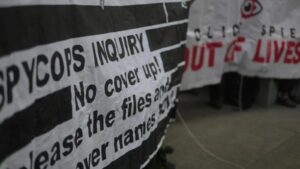 This summary covers the second week of Tranche 2 hearings of the Undercover Policing Inquiry (UCPI), examining the activities of the Metropolitan Police’s secret political unit, the Special Demonstration Squad, from 1983-92.
This summary covers the second week of Tranche 2 hearings of the Undercover Policing Inquiry (UCPI), examining the activities of the Metropolitan Police’s secret political unit, the Special Demonstration Squad, from 1983-92.
It was the first of this set of hearings to hear live evidence and question witnesses.
The UCPI is an independent, judge-led inquiry into undercover policing in England and Wales. Its main focus is the activity of two units who deployed long-term undercover officers into a variety of political groups; the Special Demonstration Squad (SDS, 1968-2008) and the National Public Order Intelligence Unit (NPOIU, 1999-2011). Spycops from these units lived as activists for years at a time, spying on more than 1,000 groups.
INTRODUCTION
It was a devastating week for Special Demonstration Squad officers at the Undercover Policing Inquiry hearings.
An officer confirmed that a colleague, HN67 ‘Alan Bond’, had admitted having a child with a woman he spied on. This is the the fourth such child that we know of. Officers knew they would be abandoning the children as toddlers and leaving the women with all the work and costs of parenthood.
Another officer, HN85 Roger Pearce ‘Roger Thorley’, was exposed not only for racism and misogyny in his pointless reporting, but also as a fantasist who made up bomb threats that made his work seem more important. It’s not only damning for him but for the Met as a whole, as he was promoted up to running Special Branch and being the Met’s Head of Intelligence.
On the opening day of the live hearings, the Campaign Opposing Police Surveillance, Police Spies Out of Lives, the Blacklist Support Group and other campaigners holding a demonstration outside the International Dispute Resolution Centre in London, before live in-person hearings began inside.
On Monday 8 July, the hearings dealt with the deployments of officer HN20 ‘Tony Williams’, and HN85 Roger Pearce ‘Roger Thorley’ spying on anarchist groups. The ‘non-state witnesses’ – those who were spied on – gave evidence first.
The hearing began with the Inquiry Legal Team (ILT) reading summaries of written evidence for officer HN20 ‘Tony Williams’, and civilian witnesses ‘MSW’ and Albert Beale. Then Dave Morris stepped up to speak about the London Worker’s Group and the Persons Unknown defence campaign.
In the afternoon Stephen Sorba gave evidence on behalf of Friends of Freedom Press.
On Tuesday 9 July, spycop HN85 Roger Pearce ‘Roger Thorley’ gave evidence all day and was subjected to a blistering cross-examination that ran several hours over the allotted time.
Wednesday 10 July saw summaries of the evidence relating to the deployments of HN12 ‘Mike Hartley’, HN82 ‘Nicholas Green’ and HN67 ‘Alan Bond’, as well as one live witness, Michael Chant, general secretary of the Revolutionary Communist Party of Britain (Marxist-Leninist).
On Thursday 11 July we heard the harrowing testimony of Frank Bennett, the half-brother of Michael Hartley, who was lost at sea in his late teens and whose identity was stolen by HN12 ‘Mike Hartley’ for his undercover deployment.
In the afternoon, HN19 ‘Malcolm Shearing’ gave evidence including about his statement to the effect that HN67 ‘Alan Bond’ fathered a child whilst undercover.
OBSERVATIONS
There really is no substitute for live evidence, and you will see in the summaries below how effectively the testimony we heard showcased not only the arrogance and abhorrent practices of the SDS officers but also the integrity and commitment of the groups and individuals they targeted – and whose trust they abused.
The Inquiry has put off hearings about some of the most controversial deployments in this Tranche until ‘Phase 2’ (which will take place in the autumn). However, this first week of evidence proved to be surprisingly exciting, and we saw further indications of changing attitudes on the part of the Inquiry Legal Team.
In particular, the cross examination of HN85 Roger Pearce ‘Roger Thorley’ was far from the forgiving ‘friendly chat’ format that was frustratingly common during cross examination of ex-undercover officers in Tranche 1.
If you have time to watch one video from this week, we would highly recommend the last couple of hours of the afternoon session of the cross examination of HN85 Roger Pearce ‘Roger Thorley’ from Day 5, Tuesday 9 July. Unfortunately, unlike the other hearings this week, the video has not yet been published by the Inquiry.
CONTENTS
Monday 8 July (Day 4)
Summaries of written evidence:
HN20 ‘Tony Williams’, MSW, and Albert Beale
Live: Dave Morris
Live: Stephen Sorba, on behalf of Friends of Freedom Press
Tuesday 9 July (Day 5)
Live: HN85 Roger Pearce ‘Roger Thorley’
Wednesday 10 July (Day 6)
Summaries of written evidence:
HN12 ‘Mike Hartley’, HN82 ‘Nicholas Green’, and HN67 ‘Alan Bond’.
Live: Michael Chant
Thursday 11 July (Day 7)
Live: Frank Bennett, family of the real Michael Hartley.
Live: HN19 ‘Malcolm Shearing’.
Day 4: Monday 8 July 2024
Click here for video, transcripts and written evidence
Summaries of written evidence: HN20, MSW and Albert Beale
These were read onto the record, and the corresponding documents and full written statements are available online.
HN20 ‘Tony Williams’
We were told that HN20 ‘Tony Williams’ provided a witness statement to the Inquiry in January 2020.
He was deployed undercover by the Special Demonstration Squad (SDS) from February 1978 to October 1982, into the London Workers Group (LWG), Persons Unknown and the Revolutionary Prisoners Group. There is a Restriction Order over his real name.
‘Williams’ said he ‘could not recall’ many details from 40 years ago, and he reported no real training, no recollection of any manual and generally described his deployment as being ‘left to our own devices’ with no tasking once they were undercover.
He described the LWG as a group supporting workers in ways which would ‘ultimately lead to revolution’, and which was dominated by anarchist politics. His reports contain evidence of him attending a birthday party in someone’s home, speaking at meetings and reporting on debates within the group. He also took positions of responsibility, including ‘publicity manager’, treasurer and secretary.
It’s clear from his reporting that the group was small and largely educational in character and hence posed no ‘threat’, and he claims he continued attending in order to maintain his cover.
However, that doesn’t explain why he would continue reporting on the group. That appears to be explained by the keen interest of the Security Service (also known as MI5) in anarchism at the time. ‘Williams’ says he was debriefed by MI5 at an SDS flat after his deployment ended and he believes they were seeing his reports.
MSW
MSW is a civilian who was reported on by SDS undercover officers, principally HN20 ‘Tony Williams’ and HN85 Roger Pearce ‘Roger Thorley’, although he has no recollection of meeting either of them. He is known only by his initials as he was granted anonymity at his request. His witness statement is dated 16 May 2024.
From 1979 to 1984, MSW was involved in ‘anarchist workerist communist circles’.
He states:
‘I was not involved in any covert illegal activity at any point when I was politically active’.
He describes his involvement with three groups in particular, the Anarchy Collective, publishing an anarchist theory magazine called Anarchy; his support for the Autonomy Club, ‘to establish and run an anarchist social centre and event space’; and the London Workers Group (LWG). The LWG was an open group of around 10 regular attendees and ‘did not have a formal organisation structure but there was always someone who was in charge of the money and took the minutes, so in theory, performing treasurer and secretary roles’.
He describes Group as publishing ‘rebellious’ content in its bulletin such as the article ‘We Want to Riot, not to Work’, which he considers:
‘should probably be understood as an expression of “punk attitude” to societal norms about the compulsion to wage labour, rather than actually advocating public disorder – it was riffing on the Brixton riots’
They supported and took part in workers’ picketing during industrial disputes, including actions ‘later deemed to be illegal on grounds like obstruction or breach of the peace’.
He states that none of the three groups used ‘violence’ to achieve their aims.
The groups variously theorised, propagandised, and organised ‘towards a generalised social revolution, which would produce its own organisational structures’. He was not surprised to learn undercover officers had reported on the groups with which he was involved, but he was shocked they entered private homes. He feels vulnerable and disgusted that the information about him was recorded, retained, used, and disseminated by Special Branch.
Albert Beale
Albert Beale is a 77-year-old civilian who was reported on by SDS officers; HN20 ‘Tony Williams’, HN65 ‘John Kerry’ and HN85 Roger Pearce ‘Roger Thorley’. His witness statement along with exhibits AB1 to AB9 are dated 8 March 2024.
Beale says he is a pacifist and has spent much of his life ‘concerned with issues of peace, justice, and sustainability and trying to act on those concerns’.
He gives an account of his early activism and later groups, he was involved with, including London Peace Action ‘a local group of antimilitarist activists’; the Anti-Falklands War Support Network in supporting ‘pacifists and others… because of their opposition to the Falklands War’; the Peace Pledge Union, which he describes as the main British pacifist organisation; War Resisters International, an international pacifist and antimilitarist network; Peace News Trustees Limited; Campaign Against Arms Trade; and the ABC Defence Campaign, defending two journalists and a soldier charged under the Official Secrets Act.
The main group Beale was – and still is – involved in was London Greenpeace, being a founder in the early 1970s. London Greenpeace was the first Greenpeace group in Europe, having been set up following an article published in Peace News in 1971.
He addresses the notions of public order and disorder in the context of the groups and campaigns, explaining that order is:
‘based on people’s acquiescence to a system of economic injustice and to a system which is producing an ecosystem which will soon be inimical to the future existence of our species’.
He defoned disorder:
‘a matter of shaking up the status quo; in my view, our world is in greater need of some “disordering”.’
He thinks most others involved in similar groups would have taken a similar view.
‘I see myself as generally committed to [direct action]. In other words, when doing what is necessary to follow my conscience, if that is judged to be in breach of some law, then so be it.’
On violence he said it ‘relate[s] essentially to harming another person’ and that damage to property is not in itself violent. He doubts that any of the groups or campaigns with which he was involved considered violence to be necessary to achieve their aims.
Beale finds the notion of ‘overthrowing parliamentary democracy’ – the spycops’ and MI5’s definition of subversion that made someone worth spying on – a puzzling one, something that was not discussed in any of the groups or campaigns.
Beale has considered the cover names of the officers that have been named as active at the time and does not recall knowing any of them well, if at all. On learning that he had been reported on by undercover officers, he said he found it unnerving. He felt betrayed and extremely unsettled. He still considers the situation to be intolerable and he is left ‘wondering if there were other people I have known who might have been doing the same’.
Live evidence: Dave Morris
Dave Morris is an influential activist throughout the 1970s and 1980s, and up to today. He has submitted a written statement for Tranche 2 Phase 1 (T2P1), dated 5 June 2024. He appeared live to be questioned by Ms Gargitter of the Inquiry Legal Team (ILT).
Due to the Inquiry’s failure to properly manage the process of disclosing police documents, he will be asked to submit further written evidence and he will be called back to speak again in Tranche 2 Phase 2 in this autumn.
His T2P1 testimony, both live and in writing, provided a detailed and nuanced perspective on his activism and the activities of the groups he was involved with. His responses highlighted the contentious nature of the reports by undercover officers and underscored ethical concerns surrounding undercover policing.
His emphasis on collective action, mutual aid and peaceful protest painted a stark contrast to the reports implying violent intent. Morris was clear on the need for a thorough and transparent inquiry and it was obvious that, as the Inquiry progresses, his insights will be crucial in understanding the broader implications of undercover operations on activist movements.
INFILTRATION IMPACTS
Morris began by detailing some of his activism, starting as a postal worker active in his trade union in the 1970s. He co-founded the London Workers Group in the mid-1970s and was active in housing issues in Islington and Hackney.
By the early 1980s, his focus shifted mainly to his local community in Tottenham, helping to set up the Tottenham Claimants’ Union. He also got involced in London Greenpeace – and beame embroiled in the McDonald’s libel case, or ‘McLibel’, which consumed a significant portion of his life for nearly a decade.
London Greenpeace was infiltrated by multiple undercover officers.
He specifically mentioned spycops HN10 Bob Lambert ‘Bob Robinson’, HN5 John Dines ‘John Barker’, and others who had deeply infiltrated their activities. They influenced the course of events and acted as agents provocateur.
One of the most striking aspects of Morris’ testimony was his account of the personal betrayals experienced by group members. He cited HN5 John Dines:
‘He engineered a long fraudulent sexual relationship with Helen Steel while she was preparing for the legal battle with McDonald’s…
He gave every impression that he was in love with Helen and that they were a couple preparing for a long relationship together. His sudden disappearance faking a mental breakdown certainly caused her intense trauma and stress for over 20 years.’
Meanwhile HN10 Bob Lambert had four sexual relationships with activists and fathered a child, later abandoning the child and his mother.
Morris emphasised the emotional toll such deceit took on individuals.
‘These weren’t just professional relationships; they were deeply personal. The police exploited our trust and used it against us.’
Morris highlighted the broader impact of undercover policing on activism. He argued that this was a deliberate tactic to try to manipulate and undermine social movements.
Spying on London Greenpeace will be looked at in detail in T2P2.
SUBVERSION AND LAWBREAKING
Morris explained that anarchism advocates for a harmonious society run by people themselves, organised on a voluntary cooperative basis without hierarchical government.
He highlighted the conclusion of SDS officer HN304 ‘Graham Coates’ who, after four years’ deployment in the 1970s, declared that:
‘The anarchists I reported on posed a minimal challenge to public order… I do not think either the International Socialists or the anarchist movement were subversive in terms of their actions….
I do not believe any information I provided whilst I was deployed was particularly significant. I do not think it would have made any difference to public
order if I had not worked for the SDS.’
Morris went further, asserting that powerful institutions, driven by self-serving elites, are the true subversives in society, subverting human cooperation and genuine democracy.
‘Such powerful institutions are generally tightly controlled by a small self-serving elite, continually obsessed with power and profit… are prepared to use violence routinely to maintain their power and control over people and society.’
He explained that while the campaigns he was involved in didn’t set out to break the law, they did encourage collective action to defend people and change things. This included challenging unfair and unjust laws which only serve to protect the rich and powerful, and the unfair and unacceptable status quo.
Morris stressed the importance of collective action and self-defence – pointing out that the right of self-defence is enshrined in law and backed by 99% of the population. Self-defence was justified particularly in response to systemic violence and exploitation, such as evictions by landlords and threats of sacking by employers.
The groups he was active in were open, publicised their activities, and encouraged collective participation.
Morris personally never used or encouraged ‘violence’, pointing to the dictionary definition of violence as ‘unjustifiable force’.
‘It’s not a question of: how can we break the law? It’s more: what do people need to do to change things? And that may include activities that are breaking the law.’
Reports by SDS officer HN20 ‘Tony Williams’ describe Morris as a key figure in the anarchist movement, a notion Morris refuted, pointing out the failure of the police to understand the collective and non-hierarchical nature of anarchist groups, which had no leaders.
‘Williams’ also described Morris as:
‘an archetypical anarchist cherishing the ideals and theories laid down by Kropotkin… frequently talks of resorting to violence to achieve these aims.’
Morris countered:
‘I have never, as far as I can recall, encouraged people to resort to violence.’
He explained that this was in contrast to all political philosophies and parties seeking power, which are based on weilding routine Government and institutional violence, with the exeption of complete Gandhian non-violence advocates.’
HN20 ‘TONY WILLIAMS’ & THE LONDON WORKERS GROUP
The London Workers Group was a collective that met weekly for over eight years. It produced leaflets and bulletins, held regular public meetings on a range of workplace-related issues, supported industrial disputes and strikes, and encouraged workers to set up their own workplace ‘shop-floor’ organisation.
Morris disagreed with the assessment from ‘Williams’ that the group was merely a talking shop, noting their practical contributions and ongoing support for workers’ rights.
When asked about the group’s size and influence, Morris explained:
‘We were a small organisation. I think you can be influential as a small group of people in different circumstances.’
He noted that they had a mailing list of about 120 supporters and publicised their meetings in publications like Time Out.
Reflecting on the role of HN20 ‘Tony Williams’, and also the impact of being told the LWG was infiltrated – but not, initially, being told by whom – Morris returned to one of the core demands of those targeted by Britain’s political secret police:
‘I think it’s really important that all the spies’ cover names and photos are released.’
He explained that the people involved with those groups are entitled to know who spied on them, and without full details might otherwise suspect other people’.
Several vintage reports by HN20 ‘Tony Williams’ were examined to establish their accuracy. One report alleged Morris encouraged a range of support tactics including ‘smashing restaurant windows’ during a strike at Garners Steak House.
He recalled the conversation but denied advocating such actions:
‘I don’t remember anything about smashing restaurant windows, and I certainly would not advocate that, especially if there were people in the restaurant’.
The group agreed to focus on support for the strikers’ picket lines.
HN20 ‘Tony Williams’ took on influential roles at various times in the London Workers Group, including treasurer and secretary, with access to sensitive personal information like financial details and mailing lists. These were sent to MI5, presumably for blacklisting purposes.
TORNESS
The Torness anti-nuclear protests in 1980 were part of a campaign against the construction of a nuclear power station in Scotland. 10,000 had attended the year before, 3,000 of whom had occupied the construction site. ‘It was a big focus for the whole anti-nuclear movement,’ Morris explained.
HN20 ‘Tony Williams’ and Morris attended a much smaller 1980 mini-festival camp and protest. Morris acknowledged that some people wanted to cut the fence:
‘I am sure the idea was to try to enter the site and occupy it, basically.’
In the end Morris took in a part in a peaceful sit-down blockade of the main entrance, which was attacked by police. Morris was arrested.
It is instructive that HN20 ‘Tony Williams’ in his witness statement admits that:
‘I did not witness nor become involved in violence whilst deployed undercover save that the police in Scotland in Torness were somewhat heavy-handed in dealing with what was essentially non-aggressive trespass’.
Hence after four years infiltrating the anarchist movement the only violence he witnessed was from the police!
PERSONS UNKNOWN
The Persons Unknown campaign was a defence campaign supporting anarchists charged with conspiracy to cause explosions. Morris described it as a traditional defence campaign, providing support to the defendants and publicising the high-profile case ‘to counter police and media hysteria’.
HN20 ‘Tony Williams’ reported Morris’ support for the campaign as an indication of sympathy for violent actions. However, Morris emphasised the importance of supporting individuals facing legal challenges without necessarily endorsing their alleged actions.
In relation to the charges, Morris maintained:
‘No, I don’t support explosions and bombs. You know, the biggest culprit is the government. They have loads of bombs and they are prepared to use them.’
In reality, the more serious charges were eventually dropped, the ‘dangerous anarchists’ given bail, and the ‘Persons Unknown’ defendants found not guilty.
QUESTIONABLE JUSTIFICATIONS
Morris did not shy away from addressing the accusations against him and his fellow activists:
He left no room for doubt that the real extremists are those in power, or who infiltrate campaign groups for their own agendas.
He argued that the police’s actions were disproportionate and unjustified, and more interested in protecting corporate interests than public safety.
Morris dismissed man of the police reports as ‘exaggerated and often inaccurate,’ citing specific examples where police reports were proven false, and pointed to moments where the police were forced to admit wrongdoing.
WRONGFUL ACCUSATIONS
Morris was also questioned about a surprise accusation made by HN85 Roger Pearce ‘Roger Thorley’ two years ago, but which had only been disclosed to Morris by the Inquiry at the very last minute before submitting his statement.
Pearce named Dave Morris in connection with an alleged recce of a ‘bomb site’ at a military barracks in Aldershot.
Pearce said in his 2022 witness statement:
‘I went to Aldershot with Dave Morris, [someone else] and possibly one other man. We were in my car, there could have been four or five of us, but I only recall those two names.’
This isn’t from an old undercover report 40 years ago, but from his recent and carefully composed declaration of fact to the Inquiry.
On Monday, Morris, giving evidence to the Inquiry, bluntly responded that the claim was ‘a load of rubbish’ and other intelligence reporting from the time appeared to back him up. Morris condemned much of Pearce’s reporting as ‘unreliable, sensationalist, sectarian, and unprofessional’.
On Tuesday, Pearce was challenged on the point by David Barr, KC the Inquiry’s barrister, and was forced to sheepishly concede that he had made ‘a mistake’.
CALL FOR ACCOUNTABILITY
In closing, Morris called for greater accountability and transparency in the Inquiry.
‘We need to know the full extent of these operations. The public deserves to know how and why their tax money was spent undermining campaigning for a better society.’
He demanded that those responsible for authorising and conducting these operations be held accountable.
‘It’s not enough to say mistakes were made. There must be consequences for these abuses of power.’
Stephen Charles Sorba
Sorba is the company secretary of Friends of Freedom Press Limited, and has been involved with the organisation since the 1970s. Freedom Press runs an anarchist publisher and bookshop in East London.
Sorba made a witness statement on behalf of the organisation, which included contributions from Dr Martin Peacock and David McCabe. During the session it was emphasized that McCabe, who had a closer relationship with HN85 Roger Pearce ‘Roger Thorley’, could provide a fuller picture. McCabe had offered to give evidence, but despite his clear recollection of Pearce, the Inquiry inexplicably refused his offer.
FREEDOM PRESS HISTORY
Freedom was established in the nineteenth century and is the longest running anarchist publishing house in Europe. Sorba explained that Freedom operated out of a four-story Victorian building known as Angel Alley. The building hosted a bookshop, various offices and, until the early 1990s, a printing press known as Aldgate Press.
The press was established to print the anarchist newspaper, Freedom, and other commercial work to subsidise its operations. The editorial collective responsible for the newspaper’s content operated on a voluntary basis, with only one paid employee in the bookshop during the 1980s.
Sorba explained:
‘The group depended on volunteers and enthusiastic people coming in, showing an interest, getting involved’.
Freedom was a focal point for anarchists in London, with individuals from various groups passing through:
‘We were one of the few organisations that had a building in London. So if you wanted to come and find out what the anarchists were doing and what were they thinking and buy one of their magazines, we were the obvious place to come to.’
HN85 Roger Pearce ‘Roger Thorley’ infiltrated Freedom between 1980 and 1984. He wrote articles for the Freedom newspaper on topics such as jury vetting, the Irish Republican Army, prison officer strikes, and critiques of police and the state.
Sorba highlighted how Pearce’s articles sometimes exacerbated internal debates within Freedom. He speculated that Pearce’s motivation might have been ‘to stir the pot somewhat.’
A significant point of contention was the publication of ‘My Little Black Book’, which contained instructions for urban guerrilla activities.
Sorba clarified that Aldgate Press took on the project as a commercial job, aware of its controversial nature but not intending to provoke direct action. ‘We were keen to print it because we were going to be paid,’ he explained.
The police searched the premises in 1982, in relation to the project, resulting in Sorba and others being detained. No charges were ever brought.
Another event discussed was the publication of a communique from the Angry Brigades Resistance Movement in the Freedom newspaper. Sorba denied any potential harm or connection to the group, explaining that they were simply reporting on a piece of news.
FUELLING DIVISIONS
The Inquiry examined intelligence reports of activities and interactions within the Freedom collective, including ideological differences, particularly regarding the Irish Republican cause.
HN85 Roger Pearce ‘Roger Thorley’ wrote several articles for the paper, including one entitled ‘Prisoners of Politics’ supporting the IRA’s demand for political status for its imprisoned members.
Sorba recalled:
‘It was certainly more sympathetic [to the IRA] than most of the editors would have felt comfortable with.’
The article was in fact published with a footnote from the editors disagreeing with Pearce’s stance, emphasising the collective’s opposition to the IRA’s methods and goals.
The inquiry focused on one vintage secret police report highlighting a particularly contentious meeting where the discussion centred on Pearce’s article:
‘The seminar on Ireland… was not wholly successful. Even in the calmer atmosphere left by the absence of [a key figure], the discussion was centred on a reply from Belfast Anarchist Collective to the Freedom review on Ireland… What should the response of Freedom Collective be to such a critical letter?’
This debate exemplified the ideological divide the article exacerbated within the collective, with most members opposing Pearce’s sympathetic view of the IRA.
‘His language is interesting in certain cases,’ Sorba also noted, reflecting how Pearce’s report of these discussions (and indeed all of his reporting) tended towards disparaging and provocative language. This was to become a key issue for Pearce’s devastating cross examination the following day.
UNDERMINING
Reflecting on Pearce’s infiltration, Sorba acknowledged that while he contributed to the physical production and distribution of the Freedom newspaper, his ultimate goal was to undermine Freedom by spying and providing information to Special Branch.
Despite this, Freedom continued to operate and has persisted beyond Pearce’s infiltration. ‘We survived that blow,’ Sorba remarked.
Sorba also noted the personal impact, ‘I have no recollection of him, but he stole my address book and knew a lot about me.’
Day 5: Tuesday 9 July 2024
Click here for video, transcripts and written evidence
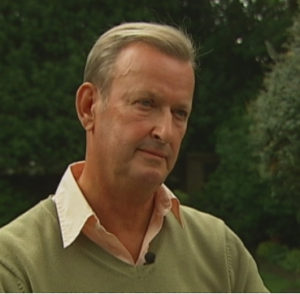
Roger Pearce, 2013
All of Day 5 was given over to the evidence of former SDS officer HN85 Roger Pearce ‘Roger Thorley’, and it produced some genuine courtroom drama.
Despite his best efforts, Pearce’s testimony revealed a damning picture of undercover policing practices in the early 1980s. Due to a last minute Restriction Order being granted to a civilian named in some of the reports, live video wasn’t available to the public, which turned out to be a real shame as the session was one of the most interesting to date.
Pearce is a particularly significant officer because of his later career. After his time as an undercover officer he went on to be promoted through the ranks to become Commander of Metropolitan Police Special Branch and Director of Intelligence.
Questioning in this session was limited to his time undercover, so he will have to be called back at a later date to discuss his further activity as a manager. However, in the light of his self-defeating performance on the stand this week, no-one will be surprised if he emigrates or finds some ruse to avoid being cross-examined again about his time as a senior officer.
David Barr KC, the Counsel to the Inquiry, led the session. It ran over time by several hours, and proved to be a stark departure from the more congenial tone of earlier hearings. Pearce was subjected to quite gruelling questioning, with Barr proving far more adept than we’ve previously seen in exposing the depths of unethical behaviour and the broader culture within the Special Demonstration Squad (SDS) and the Metropolitan Police.
Pearce provided a detailed account of creating his cover identity using the birth certificate of Roger Thorley, an 11-year-old boy who had died in a road accident. The theft of dead children’s identities was standard practice for SDS officers from the early 1970s to the mid 1990s.
Pearce admitted it was ghoulish:
‘This is a tragic death which we are exploiting really, to use for cover.’
Pearce’s initial infiltration of anti-nuclear groups like the Portobello Anti-Nuclear Group and London Peace Action was scrutinised. He had reported on their activities, including protests against the 1980 Royal Tournament at Earl’s Court.
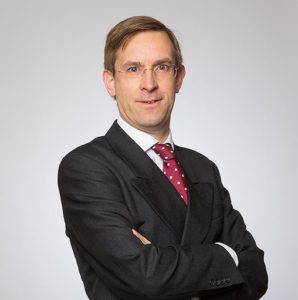
David Barr QC
When questioned about the justification for surveillance of these groups, Pearce admitted they were ‘not subversive’ and ‘not a law and order concern’. This led to extensive questioning about the scope of SDS operations and whether they were overreaching their mandate by monitoring peaceful protest groups.
The discussion revealed additional layers of Pearce’s actions, such as his reporting on the Greater London Council and public transport campaign Fare Fight. These organisations were mild in their activities, indeed, the former was an elected Local Authority. They were spied on solely due to their political stance.
The relationship between the SDS and MI5 was a major focus. Pearce mentioned ‘growing numbers of requests for assistance from MI5’ and noted that SDS managers ‘maintained and even developed the strong partnership with the Security Service.’
He described regular personal meetings with an MI5 contact, occurring every three to four months from around September 1982:
‘My clear understanding is that the initial meeting was set up as a result of an approach from MI5 to the DI [Detective Inspector] on SDS. But meetings subsequently, although not declared, were known about because I would make no secret of them and I think I would assume that I had told the office and they were encouraging it.’
The testimony covered visits by senior police officials to SDS safe houses. Pearce described visits from Gilbert Kelland (Assistant Commissioner Specialist Operations), Geoffrey Dear (Assistant Commissioner Personnel), and Kenneth Newman (Commissioner).
Newman reportedly expressed appreciation for how his SDS visit ‘brought life to the dry and arid reports with which he was faced every day’ – a comment that was to acquire greater significance later on, when we saw the sordid and fanciful nature of Pearce’s reporting, which even he admitted had more ‘entertainment’ than ‘intelligence’ value).
RIGHT TO THE TOP
This reinforces the 2022 testimony from HN34 Geoffrey Craft who told the Inquiry that Newman and the Home Secretary had visited an SDS safe house together to personally congratulate officers.
We’ve now had testimony confirming that every Commissioner from the formation of the SDS in 1968 to 2000 was very much aware of the unit and personally congratulated its officers on their work.
This completely demolishes the Met’s earlier claims that the SDS was some kind of ‘rogue unit’ that senior officers were somehow unaware of.
1968-72 – John Waldron
Rajiv Menon QC told the Inquiry Waldron gave officers champagne after an October 1968 Vietnam War protest
1972-77 – Robert Mark
Officer HN304 Graham Coates told the Inquiry Mark visited the safe house to congratulate officers
1977-82 David McNee
Officer HN200 Roger Harris told the Inquiry Mark and McNee both visited the safe house
1982-87 – Kenneth Newman
Officer HN34 Geoff Craft told the Inquiry Newman visited with the Home Secretary
Newman’s successor, Peter Imbert (Commissioner from 1987-93) was previously a Special Branch officer who personally recruited spycop HN348 ‘Sandra Davies’ to the SDS, according to her testimony to the Inquiry.
Additionally, before the Inquiry began, whistleblower SDS officer Peter Francis described how the Commissioner he served under (Imbert’s successor Paul Condon, Commissioner 1993-2000) visited the unit’s safe house and gave out bottles of whisky as a token of his gratutude.
However, the Inquiry will not be hearing evidence from Sir Kenneth Newman, David McNee or Peter Imbert. All three of them have died since the Inquiry began.
ESPIONAGE WITHOUT ETHICS
Pearce’s testimony revealed a striking lack of formal guidance on various crucial aspects of undercover work. Regarding breaching legal professional privilege, reporting on MPs or journalists, or the risk of sexual relationships, Pearce claimed there was ‘no discussion at all’.
He elaborated:
‘These were such bright red flags that they weren’t raised as specific issues in advance of any field deployment by the office.’
This lack of guidance became a major point of contention, with questions focusing on how officers were expected to navigate these ethical minefields without proper training or instruction. The Inquiry was furious with Pearce’s cavalier attitude towards legal professional privilege and the justice system.
As a trained barrister himself, Pearce’s article about the ‘corrupt’ justice system published in the anarchist newspaper Freedom, advising people to plead guilty, was particularly offensive to the Inquiry.
Pearce’s infiltration of Freedom was examined in some detail, including the articles he wrote, and his impact on the dynamic within the collective (as discussed yesterday in Stephen Sorba’s evidence).
He had reported on various anarchist activities and publications, including the production of potentially incendiary literature like ‘My Little Black Book’. The police response to these publications, including raids on anarchist premises like Freedom Press, was examined in detail and Pearce’s role in these operations was questioned.
JOURNALISTS AREN’T JOURNALISTS
The Inquiry was particularly concerned about the impact of his activities be that as editor, author of articles or police officer, on journalistic freedom of speech.
Pearce’s defence was to say that Freedom were not journalists, but that they were ‘propagandists, in their own image, who were concerned with persuading/manipulating.’
This ludicrous display of political prejudice led David Barr KC to remind him that it still falls within the wider umbrella of journalism, to get one’s argument across and to freely express one’s beliefs.
On the subject of sexual relationships, Pearce repeatedly and offensively implied that the problem was that women would demand sex with male spies, rather than the proven reality that it was the male spies who cynically tricked women activists into sexual relationships.
He also mentioned that John Jones, Director F, allegedly said they couldn’t possibly deploy MI5 officers into these left-wing groups because ‘they are promiscuous’.
Pearce explained:
‘there are certain sacrifices that even an MI5 officer can’t make for his country… there was an assumption there that these were promiscuous. I don’t think it was entirely fair but it was assumed in both policing and MI5 circles’.
These distasteful comments made clear that, right up the chain, it was thought that infiltrating these political groups meant having sex. He also described how senior officers made a visit to his wife when he was deployed to tell her to contact them, behind his back, if she had any concerns.
An extremely significant moment was when Pearce admitted that the claim made in his witness statement, placing Dave Morris on a recce for an alleged bomb plot, was completely false. This admission severely undermined any credibility he has as a witness, and a police officer. It also starkly highlighted the unreliable and often fictional nature of his reports.
FICTIONAL BOMBS
He was questioned about numerous alleged ‘bomb threats’ mentioned in his reporting. He reported an alleged bomb explosion at the Prison Officers Training School in Wakefield on 13 November 1982, and his intelligence stated ‘three unconfirmed statements by [privacy] in recent weeks indicate the existence of anarchists both willing and equipped to execute such actions.’
On closer scrutiny, Pearce proved unable to recall any details about the Wakefield incident. When pressed, he conceded, ‘No, I can’t remember. But I am assuming that there was [an explosion]’, accepting that it ‘probably wasn’t much of an explosion’.
For the Inquiry, David Barr KC pressed on, asking about another alleged bomb: ‘You have mentioned in your witness statement that there was a bomb at Holborn Theatre… we are not told a great deal there. What can you recall about it?’
Pearce conceded:
‘I can’t recall a device in the theatre in Holborn. And I can’t recall anything being recovered there’.
If his reports were to be believed, Pearce may have single-handedly uncovered more bomb plots than the entire SDS in the course of its history. However, when pressed on those incidents, Pearce admitted that no-one was ever prosecuted for any of them, presumably because no corroborating evidence could be found to support his claims.
The testimony covered several other significant events, including the Royal Wedding Day on 29 July 1981, and the Brixton riots in April 1981. This touched on witness evidence that has not yet been published on the Inquiry’s website, making reporting of it difficult (and highlighting how the Inquiry’s incompetent handling of disclosure of evidence is making this process almost impossible for us to cover!). We will hopefully return to this evidence at a later date.
Pearce was repeatedly challenged on the balance between necessary intelligence gathering and potential overreach in his reporting. He often defended SDS practices but also made admissions like:
‘It is excessive reporting but it’s a question of reporting things which unknown to me as the reporter of them may have some relevance in the wider jigsaw that’s being built by MI5 or C squad in Special Branch.’
This acknowledgment of overreach became a focal point for questioning about the overall justification and proportionality of SDS operations.
Pearce’s reports were filled with irrelevant and inappropriate information, derogatory comments about individuals’ weight, sexual preferences, and skin colour, including particularly insulting and offensive comments against women. He defended his bigoted language by claiming ‘everybody thought like that in the 1980s’.
This was met with disbelief from many of those old enough to remember the era, and made even less credible when questioning moved on to attitudes within the SDS.
Pearce claimed never to have heard any sexist or racist language in the police (despite ‘everyone’ in the 1980s thinking like that). He admitted that much of the derogatory and sensationalist details, such as describing a female activist’s appearance in demeaning terms, had ‘absolutely no intelligence value’, and that what he wrote was to entertain his handlers.
In a report from July 1983 he described a member of the Freedom collective, saying:
‘her alarmingly intemperate sexual habits make [name] a difficult associate and worthy of a Government health warning’
However, he remained unapologetic. Wanting to portray the SDS in a positive light, he unconvincingly insisted that no-one found the repeated bigoted reference and inappropriate jokes in his reporting funny, and that they got ‘no reaction at all’.
He discussed the psychological aspects of undercover work in depth, describing it as leading a ‘double life’ and building ‘false friendships.’ He said undercover work required ‘great integrity’ despite being fundamentally dishonest.
Meanwhile, he consistently demonstrated his total lack of integrity throughout the day, including admitting that an irrelevant and offensive report on the personal sex life of Dave Morris, apparently written to discredit Morris, was based on falsehoods. Pearce denied being the author (but offered no explanation as to who else might have produced it). He also admitted that while he had claimed that Morris would have considered him a ‘trusted friend’, he actually only spent time with him on one occasion.
Indeed, despite a range of offensive and sectarian reports about Morris, he eventually conceded that Morris was a ‘deep anarchist thinker… and a well liked figure within the movement’.
FICTION AS FICTION
The cross examination took on a surreal feel as the afternoon progressed, and David Barr KC moved on from questioning Pearce about his fictional intelligence reports to reading aloud extracts from his actual fiction. Pearce is the author of at least two trashy spy novels. The Inquiry scrutinised their content, revealing they were based on real-life characters he had spied on – some clearly identifiable.
The books include details clearly drawn from his undercover work, including a theme about a child born of a deceptive sexual relationship. Articles breaking the story of HN10 Bob Lambert ‘Bob Robinson’ fathering a child while undercover were published shortly before the novel, but Pearce denied any knowledge of real undercover officers fathering children with activists.
Pearce claimed his books were written decades before, in the 1990s, however references to more recent events such as the Leveson Inquiry of 2012 make that claim untenable. He also denied glorifying deceptive sexual relationships, although the vile extracts read out by Barr suggested otherwise.
The depth of Pearce’s unethical behaviour, his unrepentant attitude, and the Inquiry’s rigorous cross-examination painted a damning picture, not just of him as an individual, but of the culture of his comrades. More significantly, it’s also damning of the Met itself which chose to promote him through the ranks to Head of Intelligence, and absolutely incredible choice given that he was clearly more suited to writing barely believable fiction even then.
Day 6: Wednesday 10 July 2024
Click here for video, transcripts and written evidence
This was a short day, with summaries of the evidence surrounding the deployments of HN12 ‘Mike Hartley’, HN82 ‘Nicholas Green’, and HN67 ‘Alan Bond’ read onto the record, as well as live evidence from Michael Chant of the Revolutionary Communist Party of Britain (Marxist-Leninist).
HN12 ‘Mike Hartley’
![Honor Robson holds a photo of her brother Michael Hartley [pic: Mark Waugh]](http://campaignopposingpolicesurveillance.com/wp-content/uploads/2024/07/Honor-Robson-holds-a-photo-of-her-brother-Michael-Hartley-300x180.jpg)
Honor Robson holds a photo of her brother Michael Hartley whose identity was stolen by HN12 [pic: Mark Waugh]
This included obtaining a birth certificate and using a driving license in the cover name, as well as using the real Michael Hartley’s father’s name and his parents’ separation.
HN12 ‘Mike Hartley’ reported on the Revolutionary Communist Group and their support for sub-campaigns like the Irish Solidarity Committee and the Stoke Newington Hackney Defence Campaign (SNHDC), including alarming elements of police racism and indications of a police strategy to monitor and disrupt black activism.
His reports on the SNHDC’s support for the family of Colin Roach, who was killed in Stoke Newington police station, claimed that the SNHDC aimed to influence the family’s justice campaign and recruit black community members, describing lectures on communism as attempts to ‘continue their indoctrination.’
In April 1983, HN12 ‘Mike Hartley’ reported that the Roach family support campaign deliberately disavowed the SNHDC, highlighting the police’s efforts to undermine unity and create distrust among activists.
HN12 ‘Mike Hartley’ was arrested in January 1984 while bill posting for the Revolutionary Communist Group. He entered a guilty plea in his cover name under orders from Detective Chief Inspector Short, resulting in a £5 fine.
This incident showing contempt for the justice system and for the Hartley family demonstrated the lengths to which undercover officers were willing to go to maintain their cover.
He recorded in an aide-memoire:
‘At my insistence, under orders from Detective Chief Inspector Short, I pleaded guilty, and my co-defendant agreed to do the same. We were both fined.’
This incident demonstrated the lengths to which undercover officers were willing to go to maintain their cover. It is in direct breach of a Home Office order that if there is any chance of misleading a court then an informer or undercover officer must be withdrawn or even exposed.
In September 1984, senior members of the Revolutionary Communist Group suspected HN12 of being a police informer. The suspicion arose from his frequent absences and behaviour, such as smelling of alcohol despite his cover job as a driver.
He then shifted his focus to the Socialist Workers Party, continuing to report on their activities. His second compromise came in June 1985, after his then-girlfriend showed a holiday photograph to a colleague of herself and her policeman boyfriend. The colleague happened also to be a Socialist Workers Party member, who recognised HN12 ‘Mike Hartley’.
Reflecting on his time in the SDS, he admitted to a brief sexual liaison with an activist and yet claimed:
‘Whatever I did in the SDS I believe to have been justified and proportionate.’
This raises significant ethical concerns about the conduct of undercover officers. He claimed the woman initiated the relationship and noted:
‘No long-term relationship developed, and shortly after the encounter, I formed a relationship with somebody else and left the group.’
The deployment of HN12 ‘Mike Hartley’ deployment had severe repercussions on his own health, contributing to stress and alcohol abuse:
‘I strongly believe that my tour of duty in the SDS was the major factor in my life and career being damaged by periods of stress and alcohol abuse.’
The impact of his undercover work on his mental health underscores the intense pressures faced by these officers. The Inquiry is publishing his sickness record, which describes treatment for depression and alcoholism prior to his retirement. He was treated in the Metropolitan Police Nursing Home in Hendon and NHS rehab facilities and received public and private consultations during treatment.
He said that in the course of his treatment, he ‘felt unable to speak openly about the SD’” and had felt that being unable to talk about his deployment precluded discussion on the possible causes of his alcoholism.
HN82 ‘Nicholas Green’
This officer, also deceased, infiltrated the Finsbury Park branch of the Socialist Workers’ Party (SWP) from mid-1982 to 1985 under the name ‘Nicholas Peter Green’.
His deployment focused on reporting plans for public demonstrations and industrial actions.
HN82 ‘Nicholas Green’ also highlighted internal divisions within the SWP, particularly regarding their support for the Miners’ Strike. He reported that some members viewed the strike as a means to expand their message and increase membership, illustrating ideological divisions within the group.
He also reported that the general opinion within the Finsbury Park Socialist Workers’ Party was that an imminent revolution was unlikely and no practical preparations were being made for its arrival.
From September 1984, his reporting focused on the group Red Action and later Anti-Fascist Action (AFA), indicating that Red Action’s ideology included the ‘armed overthrow of the capitalist machine and collective control of wealth,’ and that they did not limit themselves to lawful activities.
On 28 January 1985, a Security Service note records:
‘[HN82 ‘Nicholas Green’] is finding it hard work gaining the confidence of members of Red Action. We agreed that it is worth persevering if only to demonstrate whether the group should or should not be taken seriously.’
HN82 ‘Nicholas Green’ reported that Red Action lacked funding and organisation. He referenced violence and physical confrontation engaged in by Red Action members, though it is clear that he did not witness or become involved in any of it himself.
He reported that Red Action was supportive of Irish Republican groups and that some members travelled to an anti-internment rally in Belfast in August 1985, as well as the role played by Red Action in the creation of a coalition of groups determined to confront extreme right-wing groups directly. That coalition was named Anti-Fascist Action, and the group included members from around England.
HN82 ‘Nicholas Green’ reported that within the coalition, Red Action was a group particularly keen on direct physical confrontation.
His surveillance and infiltration included detailed reporting of personal details, including employment, family heritage, and personal relationships, as well as assessments of individual ideologies, yet again underscoring the intrusive nature of SDS operations and raising serious ethical questions about the balance between state security and individual privacy.
During his deployment, HN82 ‘Nicholas Green’ reported on core participants Lindsey German (who will be giving live evidence to this inquiry on 22 July) in her capacity as a speaker and Socialist Workers’ Party central committee member, and Jeremy Corbyn, as a Member of Parliament and speaker at an AFA meeting.
HN82 ‘Nicholas Green’ was debriefed by the Security Service at the end of his deployment where it was noted that AFA membership was ‘very young, violent, and not essentially political.’ In another note it was stated that their political and ideological basis was essentially focused on hard drinking and violent confrontations with the National Front.
The Security Service note records gratitude to HN82 ‘Nicholas Green’, indicates that his deployment filled a gap in the knowledge of Red Action, and notes that he would be replaced in that role.
HN67 ‘Alan Bond’
HN67 ‘Alan Bond’, who suffers from Parkinson’s Disease and will not be giving evidence, was deployed from April 1982 to November 1985.
He infiltrated the Brixton branch of the Socialist Workers’ Party, reporting on routine activities and plans for demonstrations.
His reporting was particularly intrusive, often including personal details of individuals, such as their employment, family heritage, and personal relationships. He used inappropriate, racist language and his reports on the activities of children in connection with the Socialist Workers’ Party further highlight the invasive nature of SDS surveillance.
HN67 ‘Alan Bond’ admitted to a one-night stand with a woman from his target group, which he reported to his superiors. He denied allegations of fathering a child with a member of the target group, stating, ‘I had a one-night stand about a year before I left the field, and that was it.’
In 2002, HN67 ‘Alan Bond’ appeared in the True Spies documentary, using the pseudonym Richard, in which he discussed a product contamination threat to Lucozade, said to have been reported by HN5 John Dines ‘John Barker’.
HN67 ‘Alan Bond’ was John Dines’ manager in the SDS at the time when the Lucozade threat was reported. He said he became aware that John Dines was ‘involved in a relationship’ with London Greenpeace activist Helen Steel before he returned to the SDS as a manager, and that he approached Dines to voice his concern.
However, HN67 ‘Alan Bond’ did not take the matter further with police management owing to his close friendship with Dines. It is expected that this will be examined further in Tranche 2 Phase 2 later this year.
Live evidence: Michael Chant
Michael Chant, General Secretary of the Revolutionary Communist Party of Britain (Marxist-Leninist), provided a detailed account of his involvement with the party and its activities.
Chant emphasised the party’s commitment to peaceful activism and their stance against fascist organisations, using the slogan, ‘self-defence is the only way.’
This directly contradicts outlandish assertions made by HN19 ‘Malcolm Shearing’ that the Party was ‘small and very extreme, used petrol bombs and had taken up allegiance with Albania’.
Chant stressed:
‘we always decided on our own path. We fought on the same fronts around the world, as we would have said then, for socialism/communism.’
This challenges the narrative presented by HN19 ‘Malcolm Shearing’ and highlights the complexity of the party’s ideological alliances.
Chant discussed troubling aspects of the infiltration by HN19 ‘Malcolm Shearing’. He reported at length on the group’s sporting and cultural events. He recounted an incident where ‘Shearing’ suggested breaking through police lines to confront National Front leader Martin Webster.
Chant described this suggestion as ‘provocative’ and noted, ‘if we had followed this strategy, we would have been brutally assaulted by the police.’
He also highlighted evidence of police racism and prejudice in HN19 ‘Malcolm Shearing’s reporting, with inappropriate terms used to describe ethnicity and extensive reporting on Black activists and their communities, reflecting systemic racial prejudices within the police force, as they targeted Black activists and sought to undermine their efforts for justice.
The day highlighted increasingly familiar systemic issues within the SDS, including the theft of deceased individuals’ identities, the lack of formal training, and the intrusive nature of their operations. The personal impacts on these officers, including stress and alcohol abuse, further underscore that the Met not only had no concern for the people spied on, but the spies themselves weren’t cared for either.
Day 7: Thursday 11 July 2024
Live evidence: Francis Bennett
![Frank Bennett and Honor Robson, half-brother and sister of Michael Hartley [pic: Mark Waugh]](http://campaignopposingpolicesurveillance.com/wp-content/uploads/2024/07/Honor-Robson-and-Frank-Bennett-300x180.jpg)
Frank Bennett and Honor Robson, half-brother and sister of Michael Hartley [pic: Mark Waugh]
Bennett provided the Inquiry hearing with photos of Michael and also a letter that he had written to his mum, showing his character and close relationship with his family.
Michael Hartley disappeared at sea when he was out working on a fisherman’s trawler. He was presumed drowned but his body was never found. He was 18 years old when he died.
As the trawler was only two miles out at sea, it was a calm day and he was a very fit person, his family believed he could have easily swum that distance and survived but may have lost his memory. His mum always held on to the hope that he had survived and would turn up one day. She eventually took her own life, a tragedy Bennett attributes in part to the unresolved grief over Michael’s disappearance.
When the family were first contacted about the police using Michael’s identity, they wondered whether Michael had been found. They then found out how then police had exploited their son’s name. Bennett described the shock, horror, disgust:
‘We just never imagined that anybody would do anything like that.’
Bennett and the family have suffered recurring grief because of this, since all the memories of Michael are tainted by this undercover officer.
Bennett described the ongoing impact of learning that HN12 used his brother Michael’s identity. He talked about the toll this revelation has taken on his health and well-being
‘Since we found out about the actions of HN12, I will admit that my health has deteriorated even quicker than it had done before. I am on antidepressants and finding it hard to sleep at night. It’s just constant thoughts going through the head, you know, about the actions of HN12.’
Part of HN12’s story was pretending that he had a mother with a chronic illness who he used to visit, which Bennett found particularly upsetting. He also baulked at the idea of HN12 committing crimes and getting convicted in his brother’s name:
‘I think it’s an outrage. Because all through his time growing up, Michael never got into trouble with anybody.’
Bennett also knew about HN12’s sexual relationships, conducted using Michael’s identity, and found this abhorrent and not at all what his brother Michael would have done.
‘When I think of Michael, there is this big dark image looking over his shoulder; an adult man pretending to be Michael, doing all sorts of nasty things’.
The Inquiry also covered HN12’s compromised deployment, where he was accused of being a police informer and quickly removed from the field.
Bennett expressed concerns about the potential danger to his family if individuals targeted Michael’s real family due to suspicions about HN12:
‘On the other hand, it made me wonder, well, what was to stop these people from coming forward and searching out Michael’s real family?’
Bennett highlighted the cynical language of the SDS tradecraft manual, with its utter lack of empathy and respect for the victims of identity theft, referred to as:
‘On finding a suitable ex-person, usually a deceased child or young person with a fairly anonymous name, the circumstances of his (or her) untimely demise was investigated.
If the death was natural or otherwise unspectacular, and therefore unlikely to be findable in newspapers or other public records, the SDS officer could apply for a copy of the dead person’s birth certificate.
Further research would follow to establish the respiratory status of the dead person’s family if any and, if they were still breathing, where they were living.
If all was suitably obscure and there was little chance of the SDS officer or, more importantly, one of the wearies running into the dead person’s parents/siblings etc., the SDS officer would assume squatters’ rights over the unfortunate’s identity for the next four years.’
Bennett reflected on:
‘the total disdain the SDS had for the victims of identity theft by the undercover officers.’
He also pointed out that HN12 selected Michael’s identity from public death registers and ignored guidelines intended to prevent the use of identities with publicised deaths.
Bennett was further appalled by this further proof that the SDS were a law unto themselves, given that they hadn’t even followed their own protocol, given that Michael’s death had been publicly reported.
The Inquiry highlighted the Metropolitan Police’s apologies for the theft of dead children’s identities. Bennett dismissed these as insincere and disingenuous, feeling they were issued only because the police were compelled to do so:
‘It really doesn’t hold any water to me. It’s insincere and it’s almost like it was an afterthought.’
He demanded an assurance that the practice it will never be used again.
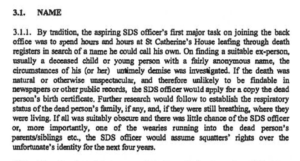
SDS Tradecraft Manual section on stealing a dead child’s identity
Live evidence: HN19 ‘Malcolm Shearing’
HN19 ‘Malcolm Shearing’ confirmed that he joined the Metropolitan Police in the early 1970s. He described the distinct culture within Special Branch, focusing more on gathering information rather than arresting people.
Reflecting on his recruitment to the SDS by HN297 Rick Clark ‘Rick Gibson’, he described the process as informal, involving casual discussions and even a dinner with a former SDS officer and their wives to discuss the work/life balance.
HN19 ‘Malcolm Shearing’ was aware of the controversial practice of stealing dead children’s identities. He described visiting the birth and death records office at St Catherine’s House to search for a suitable identity:
‘It was a very chilling experience looking for young lives that had been taken… It was not a pleasant experience’
Despite recognising the moral issues, he explained that he accepted this practice as necessary for obtaining a false driving license, essential for his undercover role. He admitted, ‘perhaps I was just compliant but I accepted it.’
The session delved into the deployment of HN19 ‘Malcolm Shearing’ into left-wing political groups. Initially focused on Maoist groups, he soon discovered that the term ‘Maoist’ was used very loosely.
He recounted attending a Communist Party of Britain (Marxist-Leninist) May Day meeting at Conway Hall in London, observing that the proceedings were ‘pedestrian in nature’ with ‘no attendance at demonstrations’.
He described how he moved on to the Revolutionary Communist Party of Britain (Marxist-Leninist) (RCPB-ML), highlighting the group’s ‘irrelevance’ and internal ideological shifts. He admitted that his political awareness and understanding of the group’s political theories was limited, and that he lacked accurate information because Special Branch records were outdated, leading to misdirected efforts.
HN19 ‘Malcolm Shearing’ reported on activities like a conference against racism and fascism, and a sports and cultural festival, noting the involvement of the ‘Pakistan National Kabbadi team’ and ‘several troops of Bhangra dancers.’
Despite acknowledging the limited policing value of these reports, HN19 ‘Malcolm Shearing’ admitted there may have been requests from the Security Service.
SPYING ON CHILDREN
His interactions with group members, included young and school-aged individuals, raising serious ethical concerns. He reported on a school-aged youth from Stockwell who spoke about ‘attacking National Front supporters’. When asked about the propriety of reporting on children, HN19 admitted, ‘no, I didn’t see any reason not to do that’.
Towards the end of his deployment, HN19 ‘Malcolm Shearing’ produced a report summarising the state of the RCPB-ML, concluding they were a spent force with ‘tediously complicated slogans’, yet he justified continued surveillance, because the Security Service was interested.
Indeed, it seems the Security Service wase highly influential in his deployment. He acknowledged receiving briefings from them, although he did not always recall specific documents. When asked if their descriptions like ‘highly security conscious’ and ‘slightly sinister’ matched his own findings about the RCPB-ML, he responded that they did not.
HN19 ‘Malcolm Shearing’ also described the informal culture among undercover SDS officers, including sharing details about their deployments during social gatherings.
ANOTHER TACTICAL CHILD
He mentioned a specific instance where another officer, HN12 ‘Mike Hartley’, gave a presentation about his arrest, handled with a mix of seriousness and levity.
One of the most contentious issues during the session was HN19 ‘Malcolm Shearing’ confirming that HN67 ‘Alan Bond’ had fathered a child with a female activist.
HN67 ‘Alan Bond’, who has Parkinson’s Disease and will not be giving evidence, submitted a statement in which he denies having fathered a child whilst undercover. However, HN19 ‘Malcolm Shearing’ recounted how ‘Bond’ casually disclosed the pregnancy to him, leaving him ‘dumbfounded’.
HN19 ‘Malcolm Shearing’ knew the woman concerned, had seen her and HN67 ‘Alan Bond’ together, and later seen her with a baby.
Despite recognising the serious ethical implications of a fellow officer fathering a child, HN19 ‘Malcolm Shearing’ chose not to report the matter at the time:
‘I just wanted to be away from it and not get involved’.
How many more spycops violated women to father children they knew they’d abandon? How many others knew about these gross abuses but did not report it?
In a powerful moment in the Inquiry, HN19 ‘Malcolm Shearing’ admitted in the witness box that he had wrestled with his conscience and was determined to come clean now.
This is only the second example of an undercover officer (since Peter Francis, who revealed the targeting of the Stephen Lawrence family campaign) publicly breaking ranks on a major SDS scandal. It is hoped that other officers due to give evidence will start to do the same.

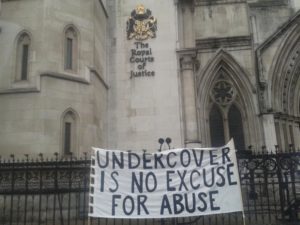 This Monday, 8 July, is the first day of live evidence hearings for Tranche 2 of the Undercover Policing Public Inquiry(i).
This Monday, 8 July, is the first day of live evidence hearings for Tranche 2 of the Undercover Policing Public Inquiry(i).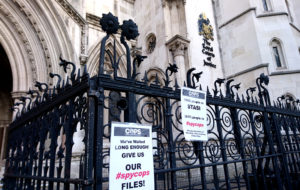 This summary covers the opening week of Tranche 2 hearings of the
This summary covers the opening week of Tranche 2 hearings of the 
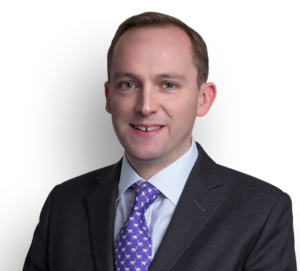


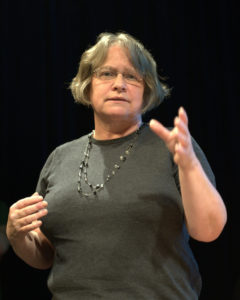
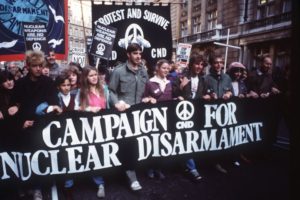
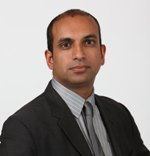

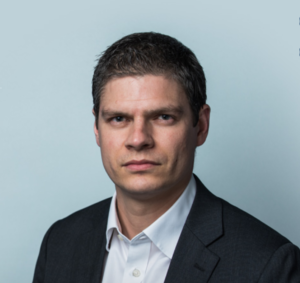
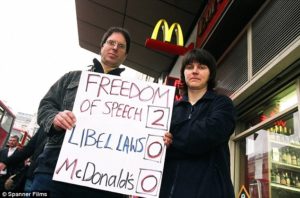
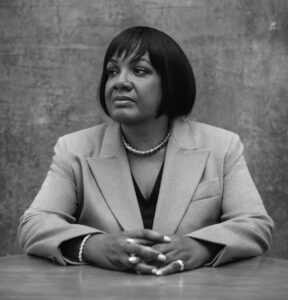
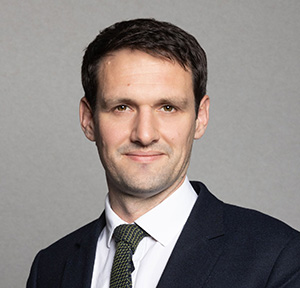
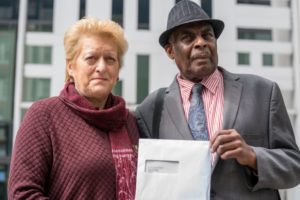
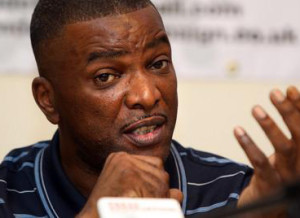

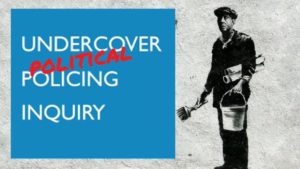 At the
At the 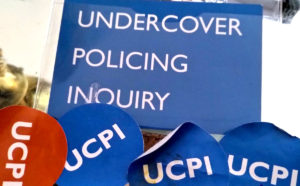 The
The 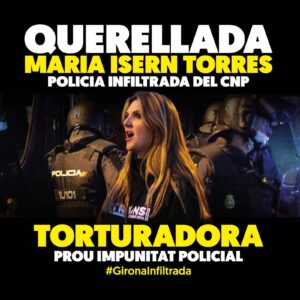 Activists in Catalonia have discovered more
Activists in Catalonia have discovered more 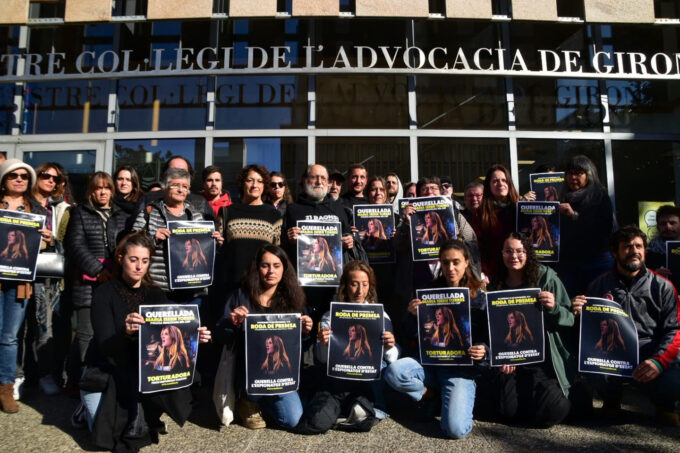
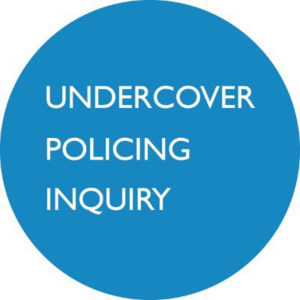 The Metropolitan Police’s political ‘spycops’ unit should have been disbanded 50 years ago, its activity was a waste of time and its intrusiveness would have caused outrage if revealed, a public inquiry has found.
The Metropolitan Police’s political ‘spycops’ unit should have been disbanded 50 years ago, its activity was a waste of time and its intrusiveness would have caused outrage if revealed, a public inquiry has found.